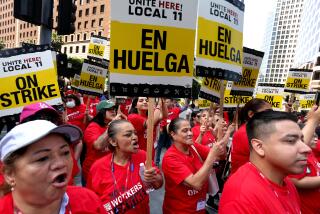Restaurant workers face smaller tips, mask resistance as Huntington Beach struggles with COVID-19 slump
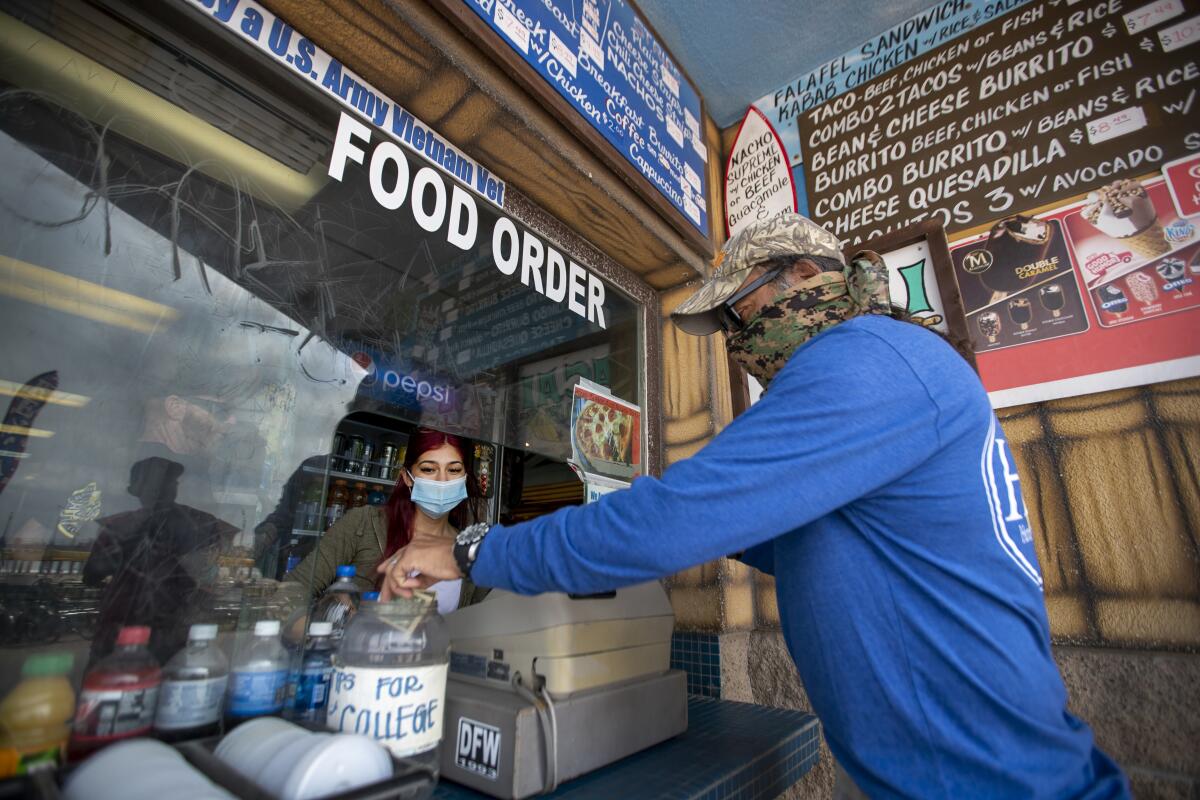
Aileen Delaportilla shook the tip jar after half a day’s work at Zack’s Beach Concessions in Huntington Beach. The clatter of loose change echoed from the nearly empty jar labeled “Tips For College.”
There was nothing more than a spare dollar and some change to split between the 21-year-old from Westminster and the cook.
Before the pandemic, Delaportilla could make at least $15 in tips after splitting with four other employees, but recently she was scraping by with $6 split between herself and one other worker. Shifts used to be staffed by four workers at a time, but the business had cut down to two employees per shift.
The stream of tourists that used to fill this Orange County beach city slowed down, and what was often left were locals who didn’t always want to follow California’s guidelines on protecting against COVID-19 — by wearing masks, for example.
“We missed out on our peak business season because of the pandemic,” Delaportilla said. “There are a lot of locals still, but usually they’re the crowd that doesn’t want to wear masks or believe in the pandemic.”
Across downtown Huntington Beach, business owners and workers have reported substantial declines in tips amid a decline in tourism during the summer and early fall months.
With much of their customer base gone, businesses have had to rely more on local residents. As out-of-state tourism declined, a growing number of restless Southern California residents from Los Angeles and the Inland Empire visited as local officials pushed to reopen Orange County beaches and businesses while other counties remained closed. Still, business owners say that didn’t make up for the overall decline.
The pandemic unleashed a new slew of problems for these service workers who rely on work to pay their bills. Working, and working harder, to make up for fewer employees and fewer tips was the only option Delaportilla had.
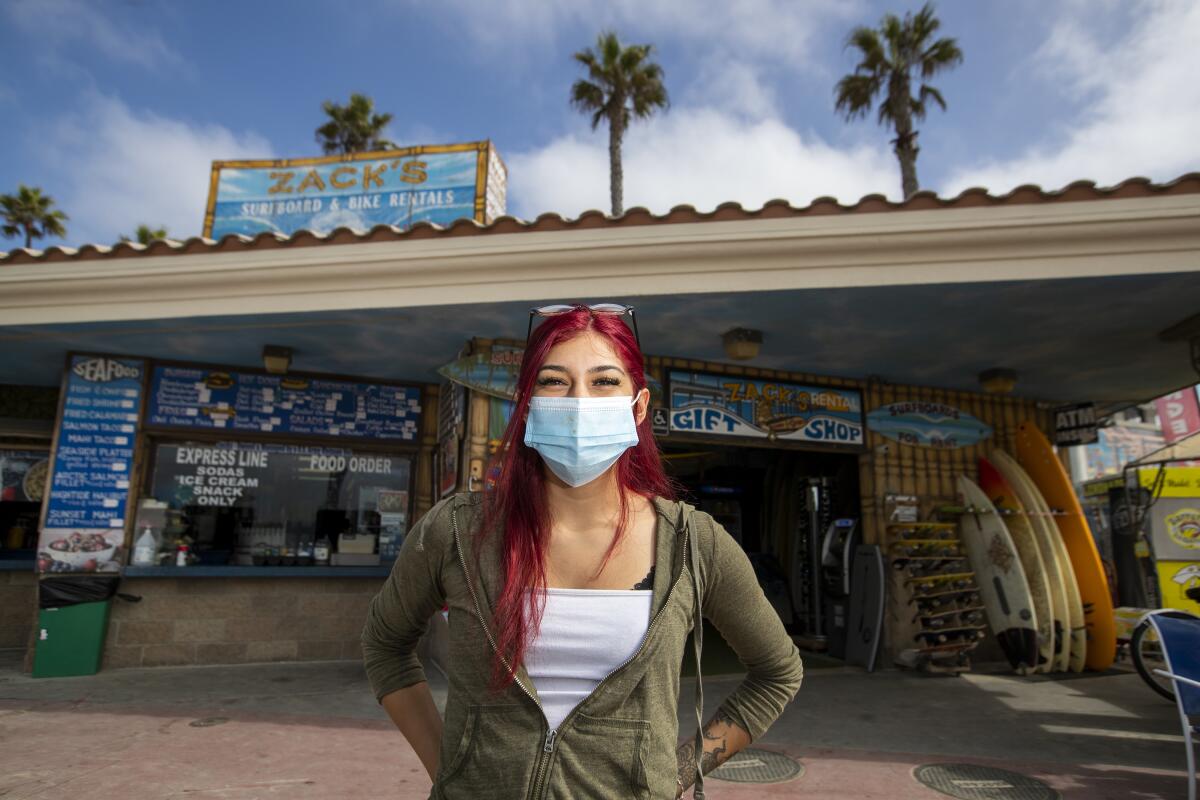
She did not want to come back to work, and neither did her parents, who are 56 and 64 years old. They feared for the family’s safety but were left no choice, as both of her parents were laid off in March from their jobs as a warehouse worker and a car salesman.
Delaportilla took on a 40-hour workweek to provide for her family in addition to her coursework at Golden West College, where she is a business major.
“I was scared to go to work over the summer, but I had to,” she said, readjusting her mask. “We see a lot of locals still, but usually they’re the crowd that doesn’t want to wear masks or respect social distancing.”
Her concerns about her own safety had to go ignored. She always wore a mask and tried to stay behind plexiglass when talking to customers.
UCLA Labor Center research manager Tia Koonse said the recession has discouraged people from patronizing local businesses and from leaving a tip. In California, about 2.6 million jobs were lost at the beginning of the stay-at-home orders in March.
“We know that most restaurants are open only exclusively for delivery or takeout, so the entire tipped workforce is not receiving,” Koonse said.
It’s commonly believed that 50% of restaurant workers’ income is from tips, she added, though it is slightly less for fast-casual workers such as Delaportilla.
On a recent day, Long Beach resident Sarah Kaler paid Delaportilla for her order of nachos and a soda but didn’t take a second look at the tip jar. The 30-year-old came down to relax at the beach with her pit bull, Rex.
“I just didn’t think about it,” Kaler said. “I’m unemployed, but also I don’t normally tip when I’m not getting sit-down service.”
Kaler previously worked at a Fujifilm warehouse but was laid off because of COVID-19. She didn’t have much to spare.
“If the circumstances were different, I would consider it,” she said.
In Huntington Beach, which became a symbol of the anti-mask rebellion, workers also had their fair share of dealing with customers refusing to abide by safety policies.
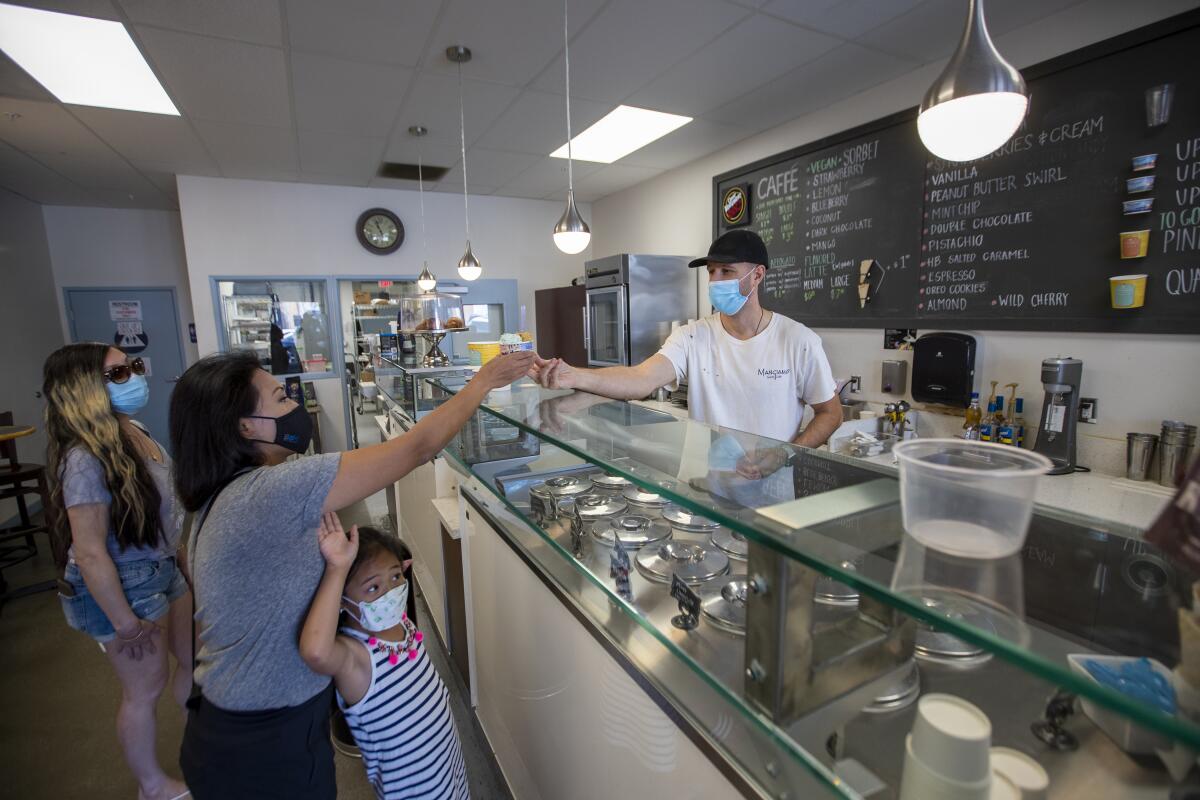
Up the street, 36-year-old Nick Lambertini, owner of Mangiamo Gelato, had his fair share of these incidents. People kept tearing down his signs informing customers to wear masks and an employee of his had gotten into a heated argument with a customer, Lambertini said.
“As a business owner, if you push it they won’t come back,” he said. “I spoke with the customer when that happened and tried to clear it up.”
The immigrant from Italy walked a fine line between ensuring his safety and trying to keep his business afloat.
“It’s not easy. I want to feel protected, but I also don’t want to offend my customers. Everything is just too political now,” Lambertini said.
Business was not going well. Lambertini had laid off most of his employees, taking it upon himself to work 12-hour shifts every day, so his main priority was to keep his customers happy.
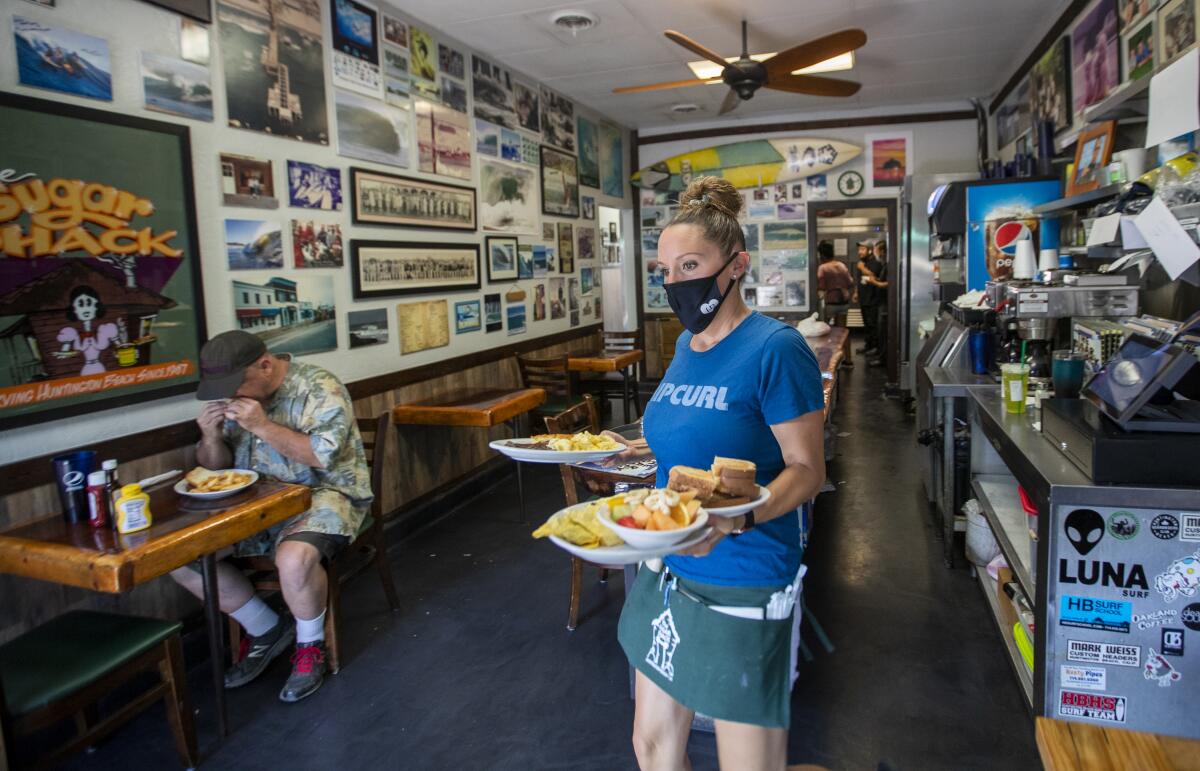
Across the street at Michele’s Sugar Shack Cafe, a family-owned business since 1967, general manager Jessica Turner served lunch to two parties sparsely populating the outdoor patio on a recent Tuesday.
Her tips have been decimated since the start of the pandemic, she said.
“People want to save money and stay safe. It makes sense, but my employees are more [worried about] getting a paycheck than catching COVID,” the mother of six said. “I was getting paid more off of unemployment checks. … We rely on our tips, so right now we’re worried about surviving.”
While tourists used to make up most of the cafe’s business and tips, Turner said she appreciated the generosity of the locals, including 94-year-old Robert Spellmire of Huntington Beach — who visited every day for the last 30 years for the lunch special.
Spellmire, whose family was well-known in the surfing community, had photos of himself and his children hanging around the restaurant. His tab hung from behind the wooden counter. He said the cafe is a local treasure he did not want to see fall by the wayside due to the pandemic.
“These people are like my family. Of course I’m going to tip them,” Spellmire said. “The pandemic didn’t impact me as much since I’m retired.”
And so at the conclusion of his meatloaf dish, he left two bucks and a quarter in tips as he always did before making his way back home.
Like Spellmire, some locals said they now tip 20% for any service since the start of the pandemic.
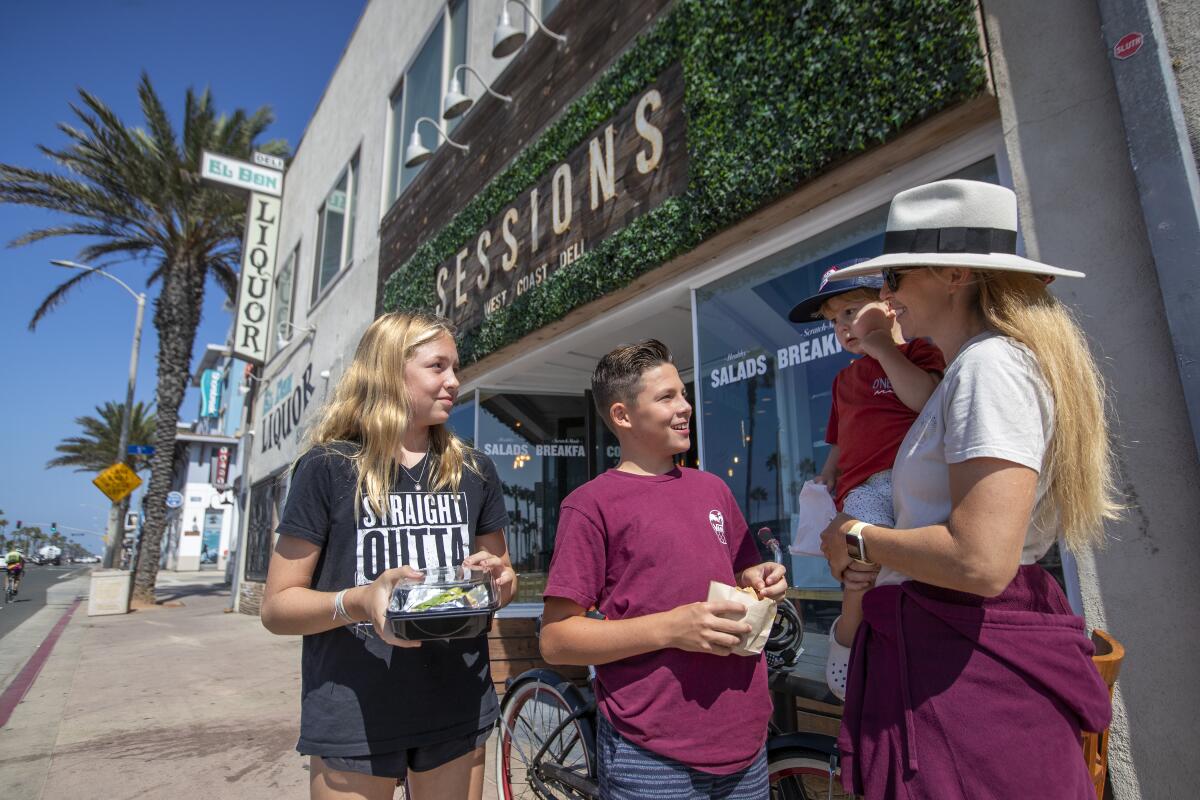
Jessie Humphries, 42, moved to a beach house in Huntington Beach for the year as her work as an attorney went remote. She often frequented the restaurants along the pier and spent a recent day at Sessions West Coast Deli with her three children, Jordan, 2; Shelbie, 10; and Jackson, 12.
“We come from Vegas, which is a tipping city; we know what it’s like for service workers, so we like to tip 20% at minimum,” Humphries said. “We’ve been tipping more than that since the pandemic.”
She previously worked as a waitress and her husband as a valet.
“We get to work remotely, but these workers can’t,” Humphries said. “I can only imagine the hardships they’re going through.”
More to Read
Start your day right
Sign up for Essential California for news, features and recommendations from the L.A. Times and beyond in your inbox six days a week.
You may occasionally receive promotional content from the Los Angeles Times.

